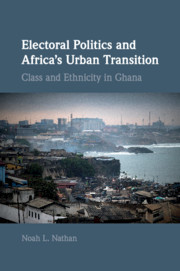Description
Electoral Politics and Africa's Urban Transition
Class and Ethnicity in Ghana
Cambridge Studies in Comparative Politics Series
Author: Nathan Noah L.
Explores the political impacts of ethnic diversity and the growth of the middle class in urban Africa.
Language: English
Subject for Electoral Politics and Africa's Urban Transition:
Approximative price 38.06 €
In Print (Delivery period: 14 days).
Add to cart
Electoral Politics and Africa's Urban Transition
Publication date: 05-2020
Support: Print on demand
Publication date: 05-2020
Support: Print on demand
Approximative price 135.14 €
In Print (Delivery period: 14 days).
Add to cart
Electoral Politics and Africa's Urban Transition
Publication date: 02-2019
363 p. · 15.6x23.5 cm · Hardback
Publication date: 02-2019
363 p. · 15.6x23.5 cm · Hardback
Description
/li>Contents
/li>Biography
/li>
Two aspects of contemporary urban life in Africa are often described as sources of political change: the emergence of a large urban middle class and high levels of ethnic diversity and inter-ethnic social contact. Many expected that these factors would help spark a transition away from ethnic competition and clientelism toward more programmatic elections. Focusing on urban Ghana, this book shows that the growing middle class and high levels of ethnic diversity are not having the anticipated political effects. Instead, urban Ghana is stuck in a trap: clientelism and ethnic voting persist in many urban neighborhoods despite changes to the socio-economic characteristics and policy preferences of voters. Through a unique examination of intra-urban variation in patterns of electoral competition, Nathan explains why this trap exists, demonstrates its effects on political behavior, and explores how new democracies like Ghana can move past it.
Part I. Introduction: 1. Urban politics in a trap; 2. Urban Ghana in context; Part II. The Middle Class and Programmatic Politics: 3. Class and preferences; 4. Credibility, patronage, and participation; Part III. Neighborhoods and Ethnic Competition: 5. Ethnic competition across neighborhoods; 6. Distributive politics in urban areas; 7. Neighborhood context, expectations of favoritism, and voting; Part IV. Implications for Urban Governance; 8. Turnout inequality and capture in municipal elections; 9. Paths out of the trap?; Bibliography; Index.
Noah L. Nathan is Assistant Professor of Political Science at the University of Michigan, Ann Arbor. He has conducted extended field research on electoral politics in Africa, especially in Ghana.
© 2024 LAVOISIER S.A.S.




